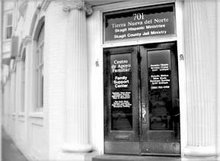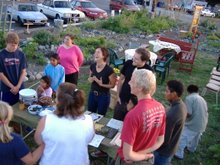 september 28, 2011
september 28, 2011Wednesday, September 28, 2011
expecting and not (yet) seeing Jesus’ healing power
 september 28, 2011
september 28, 2011Wednesday, July 13, 2011
 disappointment and expectation
disappointment and expectationbob ekblad
In my travels I often minister in places where people’s expectations of God’s intervention to bring healing or any kind of transformation are low. This is usually because they’ve suffered big disappointments: praying for friends and family who haven’t been healed but remain ill or in pain, or have died and not been resurrected.
Disappointment naturally leads people to accommodate to the status quo. We too often adjust our theology and practice to make room for prayers not being answered. On a recent trip to England Gracie and I ministered in a church that had been through some major trials and big losses, including the death of their beloved pastor from cancer five years before.
I was speaking on Acts 6-8, one of my favorite sections of Scripture these days—and was struck in a whole new way by the realism and idealism in this story. Acts 6 begins with the apostles’ selection of seven people “of good reputation, full of the Spirit and of wisdom” to serve widows at an early church version of a soup kitchen. The apostles feel called to prayer and ministry of the word, and lay hands on these seven to serve in keeping with Jesus’ way of indiscriminate love.
I continue to be amazed to read how the first of the seven, Steven is consequently “full of grace and power, performing great wonders and signs among the people” (v. 8). Then right away in Acts 7 he preaches a mega sermon that enrages his audience to such an extent that they stone him to death and widespread persecution of Jesus’ followers results.
Such a big blow to these first Christians, who’d already been through so many devastating disappointments. Jesus’ betrayal by one of their own and his arrest and execution were fresh in their memories. His resurrection certainly brought radical hope, but Jesus then left them in his ascension.
Gathering and waiting was not in vain. The Holy Spirit was poured out at Pentecost, and frightened, timid apostles were transformed overnight into bold witnesses. But persecution followed swiftly: arrests, threats, beatings, orders to not speak in Jesus’ name again. Acts 5 ends with the apostles going away from their flogging “rejoicing that they had been considered worthy to suffer shame for his name” (v. 41).
The apostles laying on of hands leads to empowerment for healing and preaching, which leads once again to martyrdom and unprecedented persecution that scatters the remaining six table servers throughout Judea and Samaria, leading to house-to-house searches, arrests and imprisonment (8:1-3). As I was preaching a verse I have mostly overlooked struck me as critical for my English audience:
“Some devout people buried Stephen, and made loud lamentation over him” (8:2).
Loud lamentation over Stephen shows how seriously these early Christians took their disappointment and pain. Lamentation, the public and private expressions of grief, of disillusionment is essential. I wondered whether this community needed to give louder voice to pain, to complaint, risking the loss of faith to receive faith anew.
I invited people suffering from deep disappointment and despondency to come forward for prayer and was surprised by how many came to the front, some of them weeping. As Gracie and I began to pray the Holy Spirit came strong and people were being visibly touched. People were comforting and praying for each other and the love of God was so tangible and deeply moving. The presence of God was so strong that many people where not able to remain standing.
After a while Gracie and I both received some words of knowledge for healing and we invited people with various conditions to come for prayer. Person after person was being healed as we had people praying for each other and Gracie and I ministered to many.
I’ve been recalling many examples in the Gospels where people who come to Jesus expressing their grief or honest assessment of their lack of relief are met with Jesus’ apt response. I feel inspired anew to bring my uncensored laments, complaints and needs before Jesus, and am finding my expectations for his saving touch increasing together with an intense longing for God’s realm to come here and now.
It’s important to note that lamentation is not a technique that guarantees immediate breakthrough. After loudly lamenting Stephen’s death, things don’t get immediately better. Saul does house-to-house searches and drags people off to prison (8:3). But in the next story Philip, the second person ordained to care for widows, flees to Samaria where crowds hear his preaching and see miraculous signs.
“For in the case of many who had unclean spirits, they were coming out of them shouting with a loud voice; and many who had been paralyzed and lame were healed. So there was much rejoicing in that city” (Acts 8:7-8).
Persecution leads to scattering, which brings God’s strong presence to the excluded Samaritans and soon to the African continent through Philip’s next encounter (8:25ff). Philip's dramatic faith adventure continues as the Spirit transports him to his next assignment, inviting us into ours.
Wednesday, September 22, 2010
 i do what i hate:
i do what i hate:more stories from the women's jail
by amy muia
On Sunday in the women’s jail Bible study, we addressed the very difficult but foundational topic of powerlessness. It’s one of the steps in alcoholics anonymous . . . admitting that our lives are out of control. The women said they had been to hundreds of “meetings;” the idea was quite familiar. But they were surprised to find it in Scripture: I don't really understand myself, for I want to do what is right, but I don't do it. Instead, I do what I hate. (Romans 7:15)
This raised some interesting questions . . . who is to blame? They’ve spent a lot of time blaming others (boyfriends, fathers, mothers, friends who betrayed them). And they’ve spent a lot of time blaming themselves (I’m no good; I can’t change; I must be defective). Yet Paul scandalously says, “So I am not the one doing wrong; it is sin living in me that does it.” (v.17)
“Yeah, but we need to take ownership of what we’ve done,” one woman said. “I need to admit that I was the one, and not somebody else.”
“But admitting you’re powerless is the first step to freedom,” another woman said. “That you’re out of control.”
I mentioned a conversation I’d had with a woman earlier in the week: “I met a guy who was a drug dealer, and he wanted to go on a date,” she had told me. “In my head, I knew it was death. And in my heart, I didn’t want to go. But I watched myself get into the car. I watched myself drive to his house. I watched myself use. I didn’t even want to. I don’t understand myself.”
I told them of the many times I’d seen women stand before the judge and say, “This isn’t me. I don’t belong in jail.” Judges are usually unsympathetic to this line of reasoning, but I could see that each woman was very sincere as she said it. Like Paul, they meant it when they said, “This isn’t really me.”
The women around the circle were all nodding. They could relate to the idea of forces acting upon them, as Paul describes. Something pushing them to do just the opposite of what they really want to do.
We continued to talk about powerlessness. There was a woman present with two black eyes, numerous abrasions, and a large gash on her forehead. I remembered her from past Bible studies; she never asked prayer for herself, but she always wanted prayer that her dog was safe. She began speaking—her speech peppered with profanity—and no attempt made to look religious, as many of the women do in ‘church.’
“I was raped last night,” she said. “I was thrown in the back of a truck and a guy was choking me. They were taking me to the river. I was completely powerless. But my last thought before I blacked out was, ‘I believe in Jesus, so I have eternal life if I die . . .’”
“That sounds like the same prayer Jesus prayed before he died,” I said. “'Father, into your hands I commit my spirit.'”
“It was?” the woman asked, shocked that she could have prayed the same prayer as Jesus did. Amazed that Jesus felt the way she felt. She grabbed a pencil and began writing. “How does it go again?”
We continued to grapple with the mystery. Choice is important. Human agency—the power to choose—is God-given. But if it were only about making good choices, the jail would be empty. All the women had made choices to do right; all had made promises. And yet, here they were. We agreed: willpower and best intentions often don’t work. Perhaps what is left is Paul: Who will free me from this life that is dominated by sin and death? Thank God! The answer is in Jesus Christ our Lord. (v. 24-25)
Maybe, I proposed, we should put the blame where it belongs. On the enemy. He is the source of evil, death, and destruction. Our part is that we agree with him, for lots of reasons. We feel unworthy of anything good. We self-sabotage because we’re afraid. We want numbness because it’s too painful to go to the deep places of hurt. We’re angry and want to punish others or ourselves. We don’t trust God; we don’t really know God. Would we be willing to break agreement? To pray Jesus’ prayer: “Father God, into your hands I commit my spirit.”
The women were willing, and we ended with the prayer. I wished we could have debriefed more, but the time was short. The guard banged the door open and the ladies filed out. Please continue to pray for breakthrough for them and for us, as we go deeper into these mysteries of the kingdom of God.
Wednesday, June 2, 2010
 Jail Bible Study on John 5:1-9 – the pool at Bethesda
Jail Bible Study on John 5:1-9 – the pool at Bethesdaby Amy Muia
1After these things there was a feast of the Jews, and Jesus went up to Jerusalem. 2Now there is in Jerusalem by the sheep gate a pool, which is called in Hebrew Bethesda, having five porticoes. 3In these lay a multitude of those who were sick, blind, lame, and withered, [waiting for the moving of the waters; 4for an angel of the Lord went down at certain seasons into the pool and stirred up the water; whoever then first, after the stirring up of the water, stepped in was made well from whatever disease with which he was afflicted.] 5A man was there who had been ill for thirty-eight years. 6When Jesus saw him lying there, and knew that he had already been a long time in that condition, He said to him, "Do you wish to get well?" 7The sick man answered Him, "Sir, I have no man to put me into the pool when the water is stirred up, but while I am coming, another steps down before me." 8Jesus said to him, “Get up, pick up your pallet and walk.” 9Immediately the man became well, and picked up his pallet and began to walk.
-------------------------------------------------
On Sunday, Sara and I met with the M&M pod (medical and medium security) in one of the little conference rooms in the Skagit County Jail. Four women came—two trustees in bright orange uniforms, and two women with medical problems. One had broken her back and neck in a car accident. The other, a native woman, was six weeks into a high-risk pregnancy—at thirty years old, she has had five miscarriages, all drug-use and domestic violence related.
We began by reading the story of the crippled man at the pool of Bethesda. We asked the women, “What stands out to you in the story?”
“The man had a lot of faith,” one of the trustees said. “He waited and waited until God answered him.”
This has been a common answer when we’ve looked at this text in the past. The women immediately assume that the man had great faith, and therefore was rewarded by God. “I see that the man had perseverance,” I said, wanting to give weight to the woman’s idea. “But did he really show evidence of great faith?”
We talked about how the man didn’t have much choice but to lie beside the pool. It was the hospital of the day, Sara observed. But it doesn’t look like a place of much hope. There doesn’t seem to be enough. All those sick people, and the angel only comes once in a while, for one person.
“Do we experience this ‘lack of enough’ in the world today?” The women agree. There aren’t enough treatment beds for addiction programs, so lots of people sit in jail, waiting. There aren’t enough social services. There isn’t enough money to pay bills. There isn’t enough hope or strength to keep going.
We look at the text again. “Does the man answer Jesus with great faith?” I ask. The women are quiet, reflecting. “He seems to offer an excuse,” Sara says. “’Someone always gets into the pool in front of me.’ He doesn’t even say that he wants to be well, when Jesus asks him.”
“Why do you think Jesus even asks him, ‘do you want to be well?’” I propose.
We talk about the role of our desires, of readiness. The woman who has suffered the miscarriages begins to speak. She’s on the verge of tears. “I feel like God’s always been waiting for me. Like God is ready, but I’m not ready.” She relates a story of praying with a friend who was sick. “I was there, commanding the pain to leave, and I was snapping my fingers, just like you guys do . . . and suddenly the presence of God was in the room, and we were lying on the floor all night with our hands in the air, just saying ‘thank you, God!’”
She continues, “But it’s so much easier just to do what I’ve been doing since I was thirteen . . . sell drugs, sell my body, steal things from stores. Instead of doing what I should be doing, I go back to what I’ve always done. ‘It will be so much easier just to do it this way,’ I tell myself. ‘I’ll save so much more money if I just do this.’ And God is standing there asking me, ‘I’m here. What are you waiting for?’”
“What I love about this story is that Jesus heals the man both from his sickness, and his excuses,” Sara says. We talk about how Jesus is enough . . . it doesn’t matter that someone else was always ahead of the man, or that there wasn’t enough angel-power to heal everyone. Jesus doesn’t wait for the angel. He just heals the man.
The trustee says again, “The man had a lot of faith. He just kept staying there until it happened. . .”
“True,” Sara says. “But Jesus pulled ‘someday’ into ‘now.’ Is there anything we’d like to see happen now, instead of waiting for ‘someday’? Something we’d like to ask Jesus for?”
The women name the things that are on their hearts: more hope, more strength, physical healing, protection for the baby. We take turns praying for each woman. The session stretches on in a beautiful way. It turns out there is a fight in one of the men’s pods. We can’t be released from the conference room until it’s dealt with, so we have extra time. We keep praying.
Suddenly a Scripture drops into my mind as we’re praying for the woman with the broken neck. “I feel like God wants you to know that he neither slumbers nor sleeps.”
“Okay,” she says, trying to deflect attention from herself. But Sara presses further. “Do you have trouble sleeping?”
“Actually I stay awake all night and sleep during the day. I can avoid all the drama that way. I have my ear plugs and my eye-shade, and I sleep all day. Then I stay up at night, when it’s calmer and I have some time to myself.”
“I guess God is saying that he’s awake, too—he’s with you through the night. He’s near you,” I say. We turn to Psalm 121 and read: I will lift my eyes to the mountains; from where shall my help come? My help comes from the Lord. He will not allow your foot to slip; he who keeps you will not slumber . . .”
The woman deflects again, awkward from the focus on herself. There are tears in her eyes. “I’m worried about Wendy’s baby,” she says. “That’s why I’m crying.”
We pray for the other women, and end with a song. The guard comes in to retrieve Wendy; she’s being released on bail. We laugh about verse 8: He will guard your going out and your coming in from this time forth and forever... The women thank us for coming, and we thank them for their transparency and humility in sharing their stories. May God keep us all.
Friday, May 28, 2010
we got podcasts!

Tierra Nueva is now offering podcasts!
We know it's not always possible to attend every event at TN. But now you can enjoy recordings of teaching, testimonies, special events, and services . . . for free!
Click here to visit our podcast site and listen to the latest updates from Tierra Nueva. Check back often to see what's new!
Are you an iTunes user? Click here for our iTunes page, where you can subscribe to the Tierra Nueva podcast. When you subscribe, you'll receive the most recent offerings automatically, whenever you open your iTunes program. And you can unsubscribe at any time.
Thanks for listening!
Wednesday, December 16, 2009
zach, a man of joy!
 This is the second 700 Club interview to feature Tierra Nueva!
This is the second 700 Club interview to feature Tierra Nueva!Click here to view the video of Zach Joy, coffee project manager, telling the testimony of how God changed his life after 17 years of drug addiction and violence.
Zach is one of our most precious friends, with a powerful story to tell! When you're finished with this video, scroll down to the next video about Ramon Luna.
Thursday, December 10, 2009
from violence to forgiveness
 TN Spanish-worship leader and lay pastor Ramon Luna (pictured center) appeared this month on the 700 Club, telling his testimony of forgiveness and how God changed his life through the jail ministry of Tierra Nueva.
TN Spanish-worship leader and lay pastor Ramon Luna (pictured center) appeared this month on the 700 Club, telling his testimony of forgiveness and how God changed his life through the jail ministry of Tierra Nueva.Not to be missed! Click here to watch the video. It's amazing how God continues to bring different streams of the body of Christ together!





